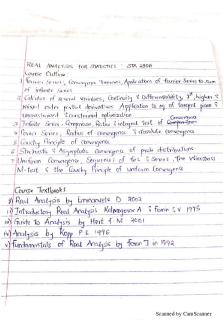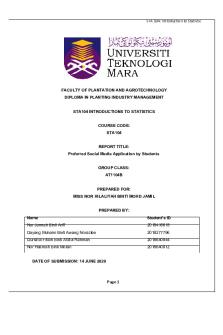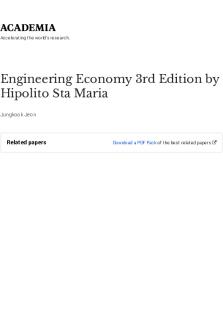Engineering Statistics STA 3032 PDF

| Title | Engineering Statistics STA 3032 |
|---|---|
| Author | Anonymous User |
| Course | Engineer Statistics |
| Institution | University of Florida |
| Pages | 6 |
| File Size | 169 KB |
| File Type | |
| Total Downloads | 79 |
| Total Views | 144 |
Summary
Syllabus...
Description
STA 3032 (Class number 20430) Spring 2019 Engineering Statistics MWF 15:00-15:50 LIT 109
Instructor: Demetris Athienitis Office: E-mail:
FLO 116B [email protected]
Teaching Assistants: Name Arek Kesiz-Abnousi Dina Akimova Course Website:
Office FLO 234 FLO 209
Email [email protected] [email protected]
Grading assignments Odd numbered Even numberesd
e-Learning
Course Notes: Available online. Notes do deviate from textbook and you are responsible for material as taught in the notes. Course Communication:
Via e-learning.
• Discussion forum in e-Learning. • Office hours (posted under “Pages” in e-Learning). • E-mail for questions regarding course policies. (Ensure that STA STA 3032 is in the subject line. Failure to do so may result in a non-response.) Required Text(s): Probability & Statistics for Engineers & Scientists, 9th Edition Author(s): Walpole, Myers, Myers, Ye; ISBN-13: 978-0-13-411585-6 Course Description: A survey of the basic concepts in probability and statistics with engineering applications. Topics include probability, discrete and continuous random variables, confidence interval estimation, hypothesis testing, correlation, regression, and analysis of variance. Prerequisite(s): MAC 2311 Credit Hours: 3 Software: You will need a computer for the homework assignments and practise. The main software used in class will be R. For more help and resources visit http://www.stat.ufl.edu/ ~athienit/software.html
1
Course Goals and Objectives: 1. Access, manipulate and analyse data using statistical software. 2. Produce appropriate graphs and descriptive statistics for one and two variables, for both categorical and continuous data. 3. Interpret graphs and descriptive statistics for one and two variables. 4. Know and apply the basic probability rules, the concepts of expected value and variance for discrete and continuous variables. 5. Know and apply the Central Limit Theorem, which is crucial for inference. 6. Understand confidence intervals and hypothesis tests. 7. Carry out and interpret one-sample and two-sample analyses for means and proportions. 8. Carry out and interpret statistical modeling using multiple regression and analysis of variance. 9. Know and apply basic quality control procedures.
Course Policies The instructor reserves the right to update any parts of this syllabus as necessary. Students will promptly be notified of any changes.
Demeanor All members of the class are expected to follow rules of common courtesy in all classroom discussions, email messages, threaded discussion and chats. Please refer to expected class netiquette online and during class.
Electronic devices During class time, only laptops and tablets are allowed. Cell phones, smartphones, and phablets are not permissible unless otherwise specified by the instructor. A student found using said device or permissable device used for non-classroom related activities during class time will be asked to leave the classroom which may result in missing any remaining assignments administered during class time.
Assignments • Students are expected to work independently, unless otherwise specified in writing. Offering and accepting solutions from others is an act of plagiarism, which is a serious offense and all involved parties will be penalized according to the UF Honor Code. Discussion amongst students is encouraged, but when in doubt, direct your questions to the instructor. • No late assignments will be accepted under any circumstances. • Students are expected to show and explain how the answers were obtained. • All electronically submitted work must be in pdf format or a standard file format such as doc, jpeg, etc. 2
Homework/Quizzes There will be homework assigned on a regular basis as suggested homework (not to be turned in) containing data analysis problems and/or book exercises. Suggested homework will be posted under “Assignments”. A timed quiz assignment based on the topics covered in class (and loosely based on the suggested homework) will be administered the day of the suggested homework deadline as either • In-class (closed notes). • Online (Only 1 attempt. It is highly encouraged to use a reliable device with a reliable wired ethernet internet connection. As soon as work is submitted a grade of 0 will show up as a placeholder until the assignment is graded.) but which format will not be announced prior. For the best preparation students are encouraged to complete the full suggested homework set by the deadline posted on the suggested homework, indicating when you should ready to take the quiz. Solutions to suggested homework will not be posted, but solutions to the quizzes will be. Exams There will be three (3) in-class exams that may comprise of multiple choice questions (≈ 90%) and some open-ended questions (≈ 10%). Exams will emphasise more on conceptual questions while HW/Quizzes will be more computational (not always). Allowed material: • Formula sheet will be provided (and can be previewed under ‘’Practice sets”) • Scientific/Graphing Calculator. Important dates: Exam #1 . . . . . . . . . . . . . . . . . . . . . . . February 15th at 15:00 Exam #2 . . . . . . . . . . . . . . . . . . . . . . . . . March 22nd at 15:00 Exam #3 . . . . . . . . . . . . . . . . . . . . . . . . . . . . . May 1st at 12:30
Grading Grade distribution: Exams 1, 2 and 3 Homework/Quizzes Extra Credit
75% (15% lowest, 30% second best, 30% best) 25% (lowest 2 scores are dropped) 0-1% (discussion forum and classroom participation)
Letter grade assignment:
B+ C+ D+ E
84 to < 88 74 to < 77 64 to < 67 < 55
A B C D
91 to 100 80 to < 84 70 to < 74 60 to < 64
3
ABCD-
88 to < 91 77 to < 80 67 to < 70 55 to < 60
To view the result of the letter grades to your GPA please visit the UF Grade and Grading Policies. Final grades shown on Canvas are not accurate because they do not account for the conditional weighing of exams and quizzes. Final grade will not be rounded up and can be calculated with exams as a % (out of 100) and quizzes out of 10 points P P quizzes − two lowest 0.15(worst) + 0.30(second best) + 0.30(best) + 0.25(100) 10(# of quizzes − 2)
Make-up Requirements for class attendance and make-up exams, assignments, and other work in this course as well as policies regarding absences, religious holidays, illness and student athletes are consistent with UF Attendance Policies Additional make-up policy requirements: • Every effort should be made to complete the assignment/exam during the open period. Only extreme situations will warrant a makeup. Contact the instructor prior to the exam - as soon as you realize you will be unable to take the assignment/exam at the scheduled time. Each case will be reviewed individually. Valid and detailed documentation is a prerequisite for scheduling a makeup under such extenuating circumstances. • If you have an emergency on the day of the assignment/exam, the instructor must be contacted by midnight of the day of the assignment/exam. • Make-ups need to be scheduled within a week from the assignment deadline. Student is responsible for scheduling. • Additional Note: Being on vacation or booking a trip prior to the completion of the semester is not a valid reason to request a makeup. Please reference the most recent Academic Calendar
Addressing Issues Technical difficulties Please contact the UF Help desk via e-Learning “Help” tab or UF IT Service Portal. Any requests for make-ups due to technical issues MUST be accompanied by the ticket number received from e-Learning when the problem is reported to them. The ticket number will document the time and date of the problem. You MUST contact your instructor within 24 hours of the technical difficulty if you wish to request a make-up. Grievances/Commendations Should you have any girevances or commendations with your experience in this course you can always address them • to the instructor at [email protected], or • the Department of Statistics. For issues that are not satisfactorily resolved at the department level or which seem to be broader than one department, students are referred to Student Complaints On-Campus or On-Line Students Complaints 4
UF and CLAS Policies Dropping, Withdrawing and Incomplete Dropping and Withdraw For late course drops and course withdrawals please visit https://catalog.ufl.edu/UGRD/academic-regulations/dropping-courses-withdrawals/ Incomplete An incomplete grade may be assigned at the discretion of the instructor as an interim grade for a course in which the student has completed a major portion of the course with a passing grade, been unable to complete course requirements before the end of the term because of extenuating circumstances, and obtained agreement from the instructor and arranged for resolution of the incomplete grade in the next term. Instructors are not required to assign incomplete grades. For complete details please visit CLAS incomplete grade policies and forms. Accommodating Students with Disabilities Students requesting accommodation for disabilities must first register with the Dean of Students Office. The Dean of Students will provide documentation to the students who must then provide this documentation to the instructor when requesting information. You must submit this documentation prior to submitting any assignments for which you are requesting accommodation.
Academic Misconduct Students are held accountable to the UF Honor Code.
Evaluations Students are expected to provide feedback on the quality of instruction in this course by completing online evaluations at https://evaluations.ufl.edu. Evaluations are typically open during the last two or three weeks of the semester, but students will be given specific times when they are open. Summary results of these assessments are available to students at https://evaluations. ufl.edu/results/.
5
Tentative Course Outline ⋆
Additional topics included Mod.
Week
1
1 2 3
2 4 5
6 6
3 7
8 4 9
10 5
11 12
6
13
Time Allowing
14
Content Notes Summary Statistics 5-9 Graphical Summaries 9-16 Sample Space, Events and Probability 17-21 Counting Methods 21-24 Conditional Probabilities and Independence 24-28 Random Variables: Properties (I) 28-32 Random Variables: Properties (II) 32-36 Random Variables: Properties (III) 36-39 Random Variables: Properties (IV) 39-45 Random Variables: Binomial, Geometric, N.B., Poisson 46-50 Random Variables: Uniform, Normal, Chi-Square, t, F 50-59 Central Limit Theorem 60-62 Normal Probability/Quantile Plot 62-64 Exam 1 Inference for Population Mean (I) 65-69 Inference for Population Mean (II) 70-74 Inference for Population Proportion 75-76 Inference for Population Variance 77-80 Distribution Free Inference (I) 81-86 Inference for Population Means: Confidence Intervals 87-92 Inference for Population Means: Hypothesis Tests 93-95 Inference for Population Variances 95-98 Distribution Free Inference (II) 98-102 Contingency Tables: Test of Independence (Pearson) 102-106 Exam 2 Simple Linear Regression (I) 107-111 Simple Linear Regression (II) 112-115 Checking Assumptions and Transforming Data 115-122 Multiple Regression (I) 122-126 Multiple Regression (II) 126-130 Qualitative Predictors 130-134 Completely Randomized Design (CRD) 135-139 CRD: Post Hoc comparisons 139-142 Randomized Block Design (RBD) 144-148 Exam 3 CRD: Distribution Free 142-144 RBD: Distribution Free 148-149
Video Textbook Assignments 1 1.1-1.5 1.1/1.1 2 1.6 3 2.1-2.2, 2.4-2.5 4 2.3 2.1/2.1 5 2.6, 2.7 6 3.1-3.3 7 4.1-4.2, 4.4 2.2/2.2 8 3.4, 4.1 9 4.2, 4.3 10 5.1-5.2, 5.4-5.5 11 6.1-6.4, 6.7, 8.6-8.7 2.3/2.3 12 8.3-8.4 13 8.8 14 15 16 17 18 19 20 21 22 23
9.1-9.5 10.1-10.4 9.10, 10.8 9.12, 10.10 16.1-16.2 9.8, 9.11 10.5, 10.9 9.13, 10.10 16.2-16.3 10.12
24 25 26 27 28 29 30 31 32
11.1-11.4, 11.8 11.5-11.6 11.10 12.1-12.2, 12.4 12.5-12.6 12.8-12.9 13.1-13.3 13.6 13.7-13.8, 13.11
33 34
16.4 ⋆
3.1/3.1 3.2/3.2
4.1/4.1
5.1/5.1 5.2/5.2 6.1/6.1...
Similar Free PDFs

Engineering Statistics STA 3032
- 6 Pages

Study Organization NUR 3032
- 1 Pages

GProject STA 220
- 24 Pages

STA 2306 REAL Analysis
- 39 Pages

Assignment STA Written Report
- 19 Pages

Fisica tecnica per STA
- 35 Pages

STA 2321 Numerical Analysis
- 69 Pages

Group Project STA 233
- 33 Pages

Sta rosa laguna ordinance
- 26 Pages

STA 104 Assignment
- 21 Pages

STA Quiz 16 Practice
- 3 Pages

Statistics
- 5 Pages
Popular Institutions
- Tinajero National High School - Annex
- Politeknik Caltex Riau
- Yokohama City University
- SGT University
- University of Al-Qadisiyah
- Divine Word College of Vigan
- Techniek College Rotterdam
- Universidade de Santiago
- Universiti Teknologi MARA Cawangan Johor Kampus Pasir Gudang
- Poltekkes Kemenkes Yogyakarta
- Baguio City National High School
- Colegio san marcos
- preparatoria uno
- Centro de Bachillerato Tecnológico Industrial y de Servicios No. 107
- Dalian Maritime University
- Quang Trung Secondary School
- Colegio Tecnológico en Informática
- Corporación Regional de Educación Superior
- Grupo CEDVA
- Dar Al Uloom University
- Centro de Estudios Preuniversitarios de la Universidad Nacional de Ingeniería
- 上智大学
- Aakash International School, Nuna Majara
- San Felipe Neri Catholic School
- Kang Chiao International School - New Taipei City
- Misamis Occidental National High School
- Institución Educativa Escuela Normal Juan Ladrilleros
- Kolehiyo ng Pantukan
- Batanes State College
- Instituto Continental
- Sekolah Menengah Kejuruan Kesehatan Kaltara (Tarakan)
- Colegio de La Inmaculada Concepcion - Cebu



